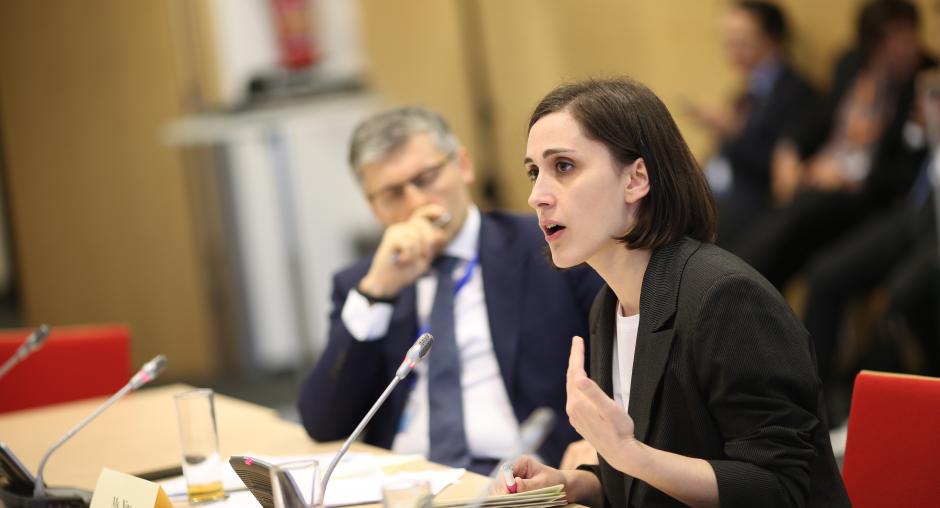Nino Tsagareishvili, co-director of the Human Rights Center in Tbilisi, speaking at the ODIHR event on freedom of peaceful assembly. Warsaw, 19 September 2019.
The latest challenges to the right to freedom of peaceful assembly in the OSCE region were discussed at an event organized by the OSCE Office for Democratic Institutions and Human Rights (ODIHR) on 19 September 2019 during ODIHR’s annual human rights conference, the Human Dimension Implementation Meeting (HDIM).
“Deprivation of the right to peaceful assembly and manifestation is one of the biggest threats for a free and democratic society. It means silencing critical voices, people with different views and those whose rights and freedoms have been violated,” said Nino Tsagareishvili, co-director of the Human Rights Center in Tbilisi. “Often, peaceful protest is the last way for people to stand up against injustice when all else fails. Therefore, upholding this right is vital for all human rights, freedom and democratic society.”
Among the 60 participants were representatives of OSCE participating States’ delegations, civil society organizations and academia. Following the presentation of ODIHR’s fourth Report on Monitoring of Freedom of Peaceful Assembly in Selected OSCE Participating States, a discussion took place about the upcoming third edition of the Guidelines on Freedom of Peaceful Assembly, a joint publication by ODIHR and the Council of Europe’s Venice Commission.
The event covered ODIHR’s ongoing work on promoting the right to freedom of peaceful assembly and highlighted findings from monitoring activities carried out in 2017-2018. Also discussed was the guidance that the new ODIHR publications can provide in identifying and addressing challenges to exercising this right. These include difficulties in holding spontaneous assemblies, blanket restrictions, the use of force and the lack of police accountability in some places, and the integration of gender and diversity perspectives into states’ efforts to create a safe and enabling environment for citizens to enjoy their right to assemble peacefully.
Participants also learned about how the ODIHR guidelines and recommendations can be used across the OSCE to develop strong legislation related to freedom of assembly and help ensure that national authorities manage assemblies in accordance with international human rights standards and OSCE commitments.
ახალი ამბები
პოპულარული
სტატია
13 თებერვალი, 2024
რატომ ვერ იბრუნებენ კონფლიქტით დაზარალებული ოსები საქართველოს მოქალაქეობას და ქონებას?
სტატია
28 დეკემბერი, 2023
სპეციალურ პენიტენციურ სამსახურს წამების მსხვერპლის სასარგებლოდ 50 000 ლარის გადახდა დაეკისრა
სტატია
13 დეკემბერი, 2023




